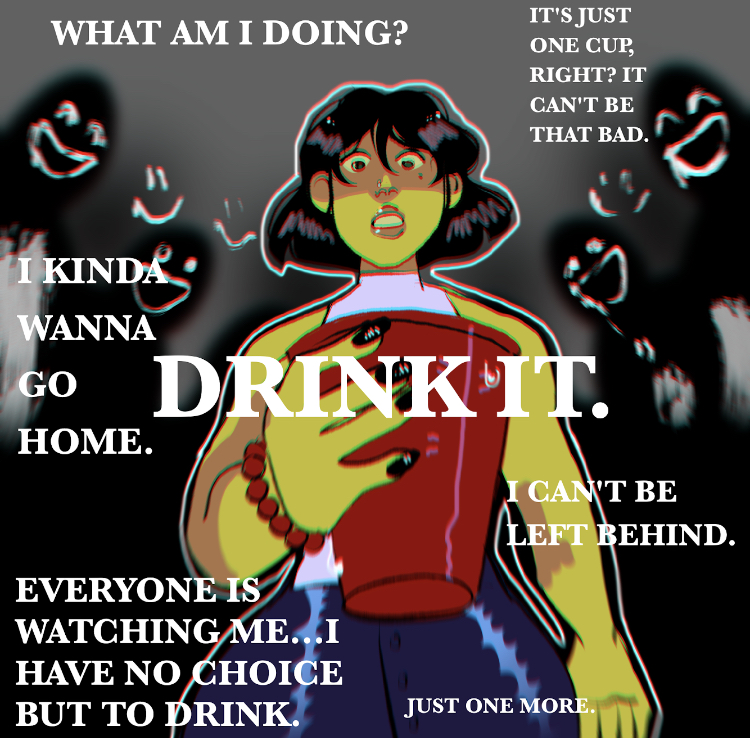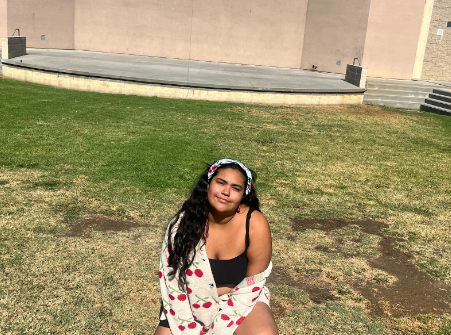Underage and under the influence leads to underachievement
Underage drinking is a common act, but teenagers need to reflect on the consequences of their actions. It is an illegal and immature act that needs more awareness.
Photo by Maricruz Reyes
When going to parties, many teenagers do not want to engage in drinking but feel an insurmountable amount of pressure. One should never feel afraid to say no to something they do not want to do.
March 19, 2019
Fingertips carefully grasp the red-plastic cup as loud music continuously pounds in the background. Familiar faces surround the teenager, and due to societal pressure, the cup is raised and a drink is taken.
For many students, the legal drinking age of 21 has long been ignored, and indulging in a cup of beer is all too common. Much of the student body regularly attends parties, and underage drinking is an activity that many partake in.
“There’s a handful of people in high school that drink; it’s more than you would expect. So many people do it because they think it’s fun, and it isn’t seen as dangerous. It’s not viewed as something that can kill or hurt you like drugs,” Angel De Luna (11) said.
From an elementary school age, students have been made aware of the ramifications of drinking alcohol through efforts including Red Ribbon Week. With the yearly efforts to raise awareness, the “alcohol is bad” lectures have become a broken record. Yes, alcohol is bad, but many teenagers simply do not care. Although choosing to drink as a teen may appear to be a harmless, gratifying act, teenagers can not escape the reality of being too immature to handle alcohol and its devastating consequences.
“I have felt pressured to conform and fit in with everyone else. My friends have never pressured me to drink, but I felt left out if I didn’t do it with them. I regret many of the times I chose to drink alcohol, because it led me to do things I wouldn’t normally do; I get embarrassed by my actions,” said a 12th grade girl.
As reported by the Center for Disease Control and Prevention, persons aged 12 to 20 account for 11 percent of all alcohol consumed in the U.S., and 90 percent of this alcohol is consumed in the form of binge drinks. In high school, the teenage brain is still developing, so the effects of a drunken night linger much longer than expected. In a study conducted by neuroscientist Susan Tapert, she found damaged nerve tissue in teens that drink alcohol; the damage negatively impacted the attention span and memory of teens. A party on the weekend may appear to be completely separate from school, but the effects of drinking transcend to the classroom and one’s mental capabilities.
In the moment, drinking alcohol may be the “cool” thing to do, but choosing to value one’s morals and health is far more admirable. Drinking at parties doesn’t provide unity among a teenager and their peers; true friends do not encourage others to be reckless and negligent towards their well-being. Not only is underage drinking illegal, but it heightens the risk of drunk driving and addiction. Always stay true to yourself, instead of succumbing to peer pressure and choosing to do something you do not want to do. For more information on the dangers of underage drinking, visit MADD.org or SAMHSA.org.







Garrett Watson • Mar 26, 2019 at 8:56 am
Thank you for shedding light on a huge issue that plagues teenagers! Underage drinking is never okay and I feel that you guys nailed it on this article. It was well written and I enjoyed reading it.
Abigail Larson • Mar 23, 2019 at 2:43 pm
Great job on this article! I think that you make a great point! I really like your headline!
Paul Lichtenfeld • Mar 20, 2019 at 8:17 am
I enjoyed reading this article. I liked the use of data and statistics to back up your claims and didn’t rely on anecdotal evidence.